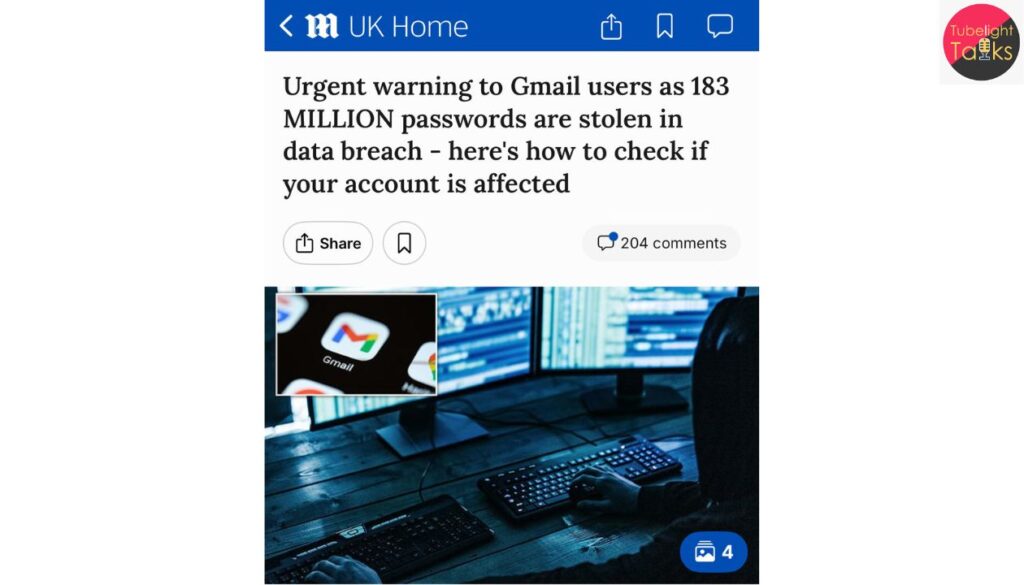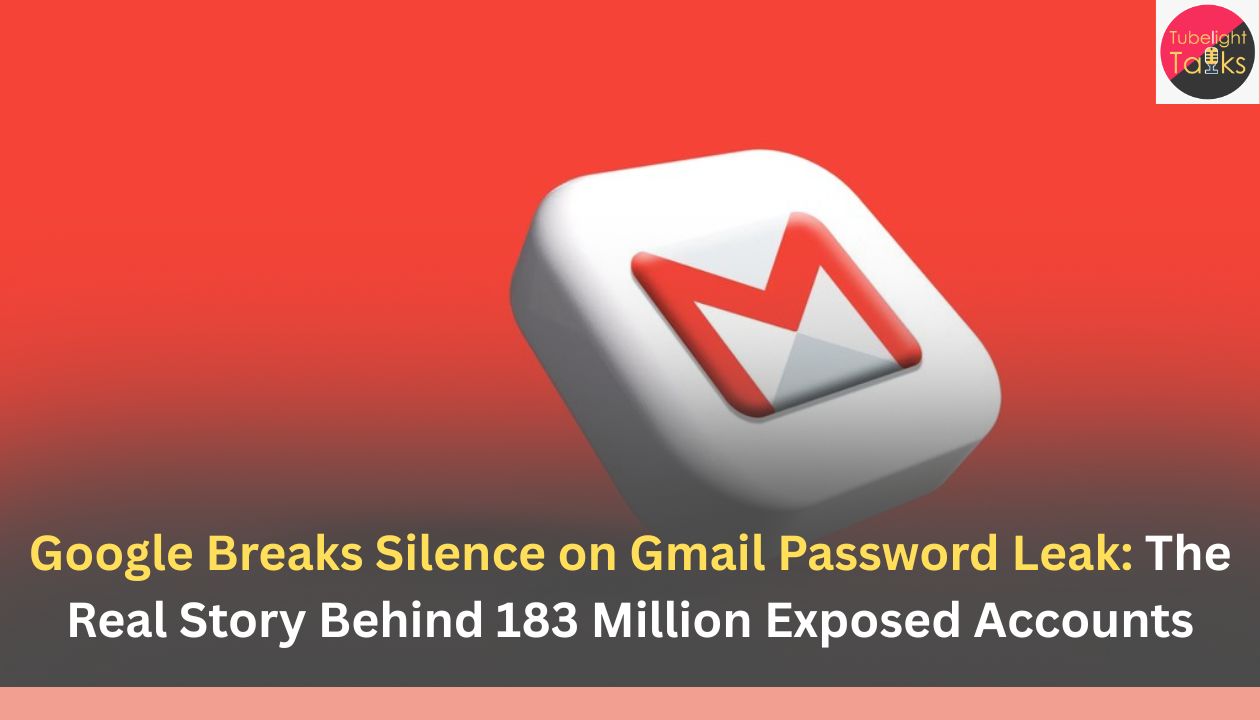Google Breaks Silence on Gmail Password Leak: The Real Story Behind 183 Million Exposed Accounts
Gmail Password Leak: A wave of panic spread across the internet after reports claimed millions of Gmail passwords were leaked online. Soon after, Google firmly denied any direct breach of its email service, calling the claims misleading and based on recycled data. The controversy began when cybersecurity researcher Troy Hunt revealed a vast 3.5-terabyte database containing 183 million stolen email credentials.
While the leak drew global attention, Google clarified that Gmail’s systems remain secure and that the exposed information stemmed from previously stolen data compiled by infostealer malware.
Key Highlights of the Gmail Password Leak Controversy
- 183 million credentials leaked: The database contained email addresses and passwords collected from various old breaches.
- Source of data: Researcher Troy Hunt confirmed the leak originated from infostealer logs — not from Gmail servers.
- Google’s response: The company denied any new attack, stressing that Gmail’s defences remain strong.
- Massive 3.5-terabyte dataset: The files were added to the Have I Been Pwned (HIBP) database on October 21, 2025.
- 16.4 million new credentials: Around eight percent of the exposed data had not been seen in any previous leaks.
- Google’s advice: Turn on 2-Step Verification, adopt passkeys, and reset passwords if your details appear online.
How the Gmail Password Leak Story Unfolded
The confusion began when reports surfaced online that millions of Gmail passwords were part of a major new breach. The figure—183 million compromised accounts—sparked global alarm. The source was Troy Hunt, the Australian security researcher behind Have I Been Pwned, who confirmed the existence of a vast 3.5-terabyte collection of stolen data.
The New York Times and other international outlets highlighted Hunt’s findings, prompting users to check if their credentials were exposed. Many feared that Gmail itself had been hacked, but Google quickly stepped in to clarify that its servers had not been breached.
Google Denies Fresh Breach Claims
On its official X (formerly Twitter) account, News from Google wrote:
“Reports of a ‘Gmail security breach impacting millions of users’ are false. Gmail’s defences are strong, and users remain protected.”

Google explained that the reports were based on a misunderstanding of infostealer databases—repositories that compile data from various credential-theft incidents rather than a single targeted hack. The company reiterated that Gmail’s infrastructure was not compromised and that it continuously monitors for large batches of exposed credentials. When such data dumps appear online, Google helps affected users reset passwords and secure their accounts.
Inside the Infostealer Data Dump
According to Troy Hunt’s detailed analysis, the leaked database included “stealer logs and credential-stuffing lists.” These logs are generated when malicious software, called infostealers, records login information entered by victims on websites.
Each record typically includes three pieces of information:
- Website address
- Email address
- Password
Hunt’s research, supported by data from cybersecurity firm Synthient, revealed that the 3.5 terabytes of stolen information contained about 23 billion rows of data collected over the course of a year. An internal review of a 94,000-record sample showed that roughly 92 percent of the data was recycled from previous leaks such as the ALIEN TXTBASE logs. Still, about 8 percent—or 16.4 million credentials—were new, making it one of the most extensive datasets of its kind.
Expert Guidance for Users
Troy Hunt urged users to check whether their email addresses were listed in the HIBP database. The process is simple: visit HaveIBeenPwned.com, enter your email, and see if it appears in any known breaches. If it does, change the password immediately and enable two-factor authentication.
Hunt emphasized that credential reuse is one of the biggest threats in cybersecurity. When people use the same password across multiple sites, one compromised login can lead to multiple account takeovers. Regularly updating passwords and using a password manager can significantly reduce that risk.
Google’s Official Advice to Gmail Users
Following widespread coverage of the leak, Google issued a detailed statement reaffirming that Gmail itself had not been hacked. A spokesperson said:
“This report covers broad infostealer activity that targets many types of web activities. When it comes to email, users can help protect themselves by turning on 2-step verification and adopting passkeys as a simpler and stronger alternative to passwords.”
Google advised users who suspect suspicious activity to immediately review account activity from their Gmail settings. If they cannot log in, they should proceed to the Account Recovery page and follow the verification steps.
The company also reminded users that Chrome’s Password Manager → Password Checkup feature can identify weak, reused, or compromised passwords. Google automatically prompts users to change unsafe credentials when large leaks are detected—even if they don’t use the Password Checkup tool.
Cybersecurity Experts Call for Vigilance
Cyber experts say that the Gmail episode serves as a reminder of how dangerous infostealer malware has become. Attackers often spread these programs through malicious downloads or phishing emails, silently capturing users’ credentials. Even if Gmail itself is secure, stolen logins can still be used for credential-stuffing attacks, where hackers test the same password across multiple services.
The consensus among experts is clear: no matter how strong a company’s security is, users must adopt proactive measures—strong unique passwords, multi-factor authentication, and regular checks for data exposure.
Spiritual Insight: The Guiding Light of Saint Rampal Ji Maharaj’s Wisdom
In today’s fast-changing digital era, where technology dominates every aspect of life, the importance of ethics, truth, and spiritual awareness becomes even more vital. Cybercrimes, data theft, and greed for quick gains reflect a deeper moral disconnect in society. True knowledge helps individuals rise above such tendencies by understanding the eternal principles of cause and consequence. Every action—right or wrong—inevitably returns its result, shaping not only this life but also the journey beyond.
Saint Rampal Ji Maharaj teaches that wealth obtained through deceit or harm brings only temporary satisfaction but leads to long-term suffering. Those who embrace the divine wisdom of Supreme God Kabir Ji, as revealed through the spiritual discourses of Saint Rampal Ji Maharaj, experience a profound transformation. Many who once lived in darkness have found peace, honesty, and true prosperity through devotion and righteous living.
To discover this enlightening path, read the sacred book “Jeene Ki Raah”, and explore more on www.jagatgururampalji.org and the Sant Rampal Ji Maharaj YouTube Channel.
Protecting Your Online Identity in the Post-Leak Era
The latest controversy surrounding Gmail underscores a growing reality: data leaks rarely originate from one platform alone. Instead, they emerge from an ecosystem of stolen credentials traded and reused across the dark web.
Also Read: Cybersecurity Threats and Data Privacy in the Digital Age
While Google’s infrastructure remains uncompromised, the incident highlights the importance of user vigilance. By enabling two-step verification, adopting passkeys, and avoiding password reuse, individuals can minimize the fallout from large-scale credential dumps like this one.
As cybercrime networks continue to evolve, the message from both Google and researchers like Troy Hunt is simple—your strongest defence is awareness and timely action.
FAQs on Gmail Password Leak and Google’s Official Clarification
1. Was Gmail really hacked in the recent 183 million password leak?
No. Google confirmed there was no Gmail breach; the leaked data came from old infostealer databases, not Gmail’s servers.
2. What is the source of the 183 million leaked passwords?
Cyber expert Troy Hunt revealed the data originated from infostealer malware logs and old credential dumps, not a new targeted Gmail attack.
3. How can I check if my Gmail credentials were leaked?
Visit HaveIBeenPwned.com, enter your email, and review if your credentials appear in any known breaches.
4. What steps has Google advised to protect Gmail accounts?
Google recommends turning on 2-Step Verification, adopting passkeys, resetting exposed passwords, and reviewing account activity for suspicious logins.
5. How many new credentials were found in the leaked database?
Troy Hunt’s analysis found about 16.4 million previously unseen email addresses, representing roughly 8% of the total 183 million leaked credentials.











Discussion (0)